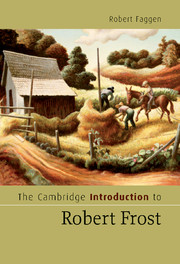4 - Reception
Published online by Cambridge University Press: 05 June 2012
Summary
Robert Frost's recognition as a poet came relatively late but grew into a spectacular crescendo that has never stopped, even if critical appreciation has been divided among poets, literary critics, and general readers. He had tried and most often failed to publish his poems in magazines in the United States. The only collections of his poetry that he had assembled before 1912 were the privately printed Twilight, just two copies of three poems for Elinor, and a small collection for Susan Hayes Ward, editor of the Independent. After arriving in England, Frost assembled A Boy's Will, and the first English publisher to whom Frost presented it, David Nutt, agreed to publish it. Frost was thirty-nine when it appeared. A year later, Nutt published North of Boston, a book consisting of poems far different in form from the first book.
Frost received remarkable praise on both sides of the Atlantic, expressing different perceptions on how he had become an American poet. Of A Boy's Will, Norman Douglas wrote in The English Review:
Nowhere on earth, we fancy, is there more outrageous nonsense printed under the name of poetry than in America; the author, we are told, is an American. All the more credit to him for breaking away from this tradition — for such it can be called — and giving us not derivative, hypersensuous drivel, but an image of things really heard and seen. There is a wild, racy flavour in his poems; they sound that inevitable response to nature which is the hallmark of true lyric feeling.
- Type
- Chapter
- Information
- The Cambridge Introduction to Robert Frost , pp. 162 - 174Publisher: Cambridge University PressPrint publication year: 2008

